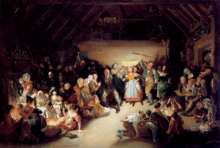ฮาโลวีน
| ฮาโลวีน | |
|---|---|
 แจ็กโอแลนเทิร์น หนึ่งในสัญลักษณ์ของวันฮาโลวีน | |
| จัดขึ้นโดย | คริสต์ศาสนิกชนตะวันตกและศาสนิกชนอื่น ๆ ทั่วโลก[1] |
| ความสำคัญ | วันแรกของฮัลโลไทด์ |
| การเฉลิมฉลอง | ทริกออร์ทรีต, งานเลี้ยงชุดฮาโลวีน, ประดิษฐ์แจ็กโอแลนเทิร์น, จุดกองไฟ, ดูดวง, เล่นบ้านผีสิง |
| การถือปฏิบัติ | การอธิษฐาน,[2][3] การอดอาหาร,[1] |
| วันที่ | 31 ตุลาคม |
| ส่วนเกี่ยวข้อง | วันแห่งคนตาย, วันสมโภชนักบุญทั้งหลาย |

ฮาโลวีน (อังกฤษ: Halloween, ออกเสียง: /ˌhæləˈwiːn, -oʊˈiːn, ˌhɑːl-/, กร่อนเสียงจาก "ออลแฮโลอีฟนิง" หมายถึง "เย็นนักบุญทั้งหลาย"[4]) เป็นเทศกาลประจำปีเฉลิมฉลองในหลายประเทศทุกวันที่ 31 ตุลาคม อันเป็นวันก่อนวันสมโภชนักบุญทั้งหลายของศาสนาคริสต์ตะวันตก
นักวิชาการจำนวนมากกล่าวว่า ออลแฮโลวส์อีฟ (All Hallows' Eve) เป็นวันสมโภชที่ศาสนาคริสต์รับมาซึ่งเดิมได้รับอิทธิพลจากเทศกาลเก็บเกี่ยวของเคลต์[5][6] โดยอาจมีเหง้าเพเกิน โดยเฉพาะอย่างยิ่ง ซาวิน (Samhain) ของชาวเกล (Gaels)[7][8][9] นักวิชาการบางส่วนยังยืนยันว่า ฮาโลวีนกำเนิดขึ้นแยกกับซาวินและมีเหง้าศาสนาคริสต์อย่างเดียว[10][11]
กิจกรรมฮาโลวีนมีทริกออร์ทรีต (trick-or-treating) ร่วมงานเลี้ยงเครื่องแต่งกาย ประดับตกแต่ง แกะสลักฟักทองเป็นแจ็กโอแลนเทิร์น (jack-o'-lantern) จุดคบเพลิง ไปบ้านผีสิงที่จัดขึ้น เล่นตลก เล่าเรื่องสยองขวัญและดูภาพยนตร์สยองขวัญ และรวมถึงการแต่งชุดคอสเพลย์ไปขอขนมตามสถานที่ต่างๆอีกด้วย
อ้างอิง[แก้]
- ↑ 1.0 1.1 อ้างอิงผิดพลาด: ป้ายระบุ
<ref>ไม่ถูกต้อง ไม่มีการกำหนดข้อความสำหรับอ้างอิงชื่อFasting - ↑ The Book of Occasional Services 2003. Church Publishing, Inc. 2004. ISBN 978-0898694093. สืบค้นเมื่อ 31 October 2011.
Service for All Hallows' Eve: This service may be used on the evening of October 31, known as All Hallows' Eve. Suitable festivities and entertainments may take place before or after this service, and a visit may be made to a cemetery or burial place.
- ↑ Anne E. Kitch (2004). The Anglican Family Prayer Book. Church Publishing, Inc. ISBN 978-0819225658. เก็บจากแหล่งเดิมเมื่อ 25 มกราคม 2017. สืบค้นเมื่อ 31 ตุลาคม 2011.
All Hallow's Eve, which later became known as Halloween, is celebrated on the night before All Saints' Day, November 1. Use this simple prayer service in conjunction with Halloween festivities to mark the Christian roots of this festival.
- ↑ Thomas Thomson, Charles Annandale (1896). A History of the Scottish People from the Earliest Times: From the Union of the kingdoms, 1706, to the present time. Blackie. สืบค้นเมื่อ 31 October 2011.
Of the stated rustic festivals peculiar to Scotland the most important was Hallowe'en, a contraction for All-hallow Evening, or the evening of All-Saints Day, the annual return of which was a season for joy and festivity.
- ↑ "BBC – Religions – Christianity: All Hallows' Eve". British Broadcasting Corporation (BBC). 2010. สืบค้นเมื่อ 1 November 2011.
It is widely believed that many Hallowe'en traditions have evolved from an ancient Celtic festival called Samhain which was Christianised by the early Church.
- ↑ "Halloween." History.com. Retrieved 24 October 2013.
- ↑ อ้างอิงผิดพลาด: ป้ายระบุ
<ref>ไม่ถูกต้อง ไม่มีการกำหนดข้อความสำหรับอ้างอิงชื่อChristianity3 - ↑ Nicholas Rogers (2002). Halloween: From Pagan Ritual to Party Night. Oxford University Press. สืบค้นเมื่อ 31 October 2011.
Halloween and the Day of the Dead share a common origin in the Christian commemoration of the dead on All Saints' and All Souls' Day. But both are thought to embody strong pre-Christian beliefs. In the case of Halloween, the Celtic celebration of Samhain is critical to its pagan legacy, a claim that has been foregrounded in recent years by both new-age enthusiasts and the evangelical Right.
- ↑ Austrian information. 1965. สืบค้นเมื่อ 31 October 2011.
The feasts of Hallowe'en, or All Hallows Eve and the devotions to the dead on All Saints' and All Souls' Day are both mixtures of old Celtic, Druid and other pagan customs intertwined with Christian practice.
- ↑ "BBC – Religions – Christianity: All Hallows' Eve". British Broadcasting Corporation (BBC). 2010. สืบค้นเมื่อ 1 November 2011.
The Oxford Dictionary of World Religions also claims that Hallowe'en "absorbed and adopted the Celtic new year festival, the eve and day of Samhain". However, there are supporters of the view that Hallowe'en, as the eve of All Saints' Day, originated entirely independently of Samhain and some question the existence of a specific pan-Celtic religious festival which took place on 31st October/1st November.
- ↑ Rogers, Nicholas (2003). Halloween: From Pagan Ritual to Party Night. Oxford University Press. p. 22. ISBN 9780195168969.
Festivals commemorating the saints as opposed to the original Christian martyrs appear to have been observed by 800. In England and Germany, this celebration took place on 1st November. In Ireland, it was commemorated on 20th April, a chronology that contradicts the widely held view that the November date was chosen to Christianize the festival of Samhain.
{{cite book}}:|access-date=ต้องการ|url=(help)
แหล่งข้อมูลอื่น[แก้]
- ความจริงเกี่ยวกับฮัลโลวีน (ไทย)
- "A brief history of Halloween" by the BBC
- "The History of Halloween" by the History Channel
- ประวัติฮาโลวีน จากเว็บราชบัณฑิตยสถาน
